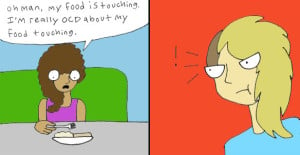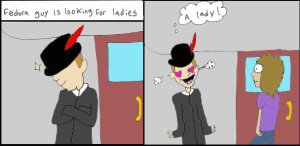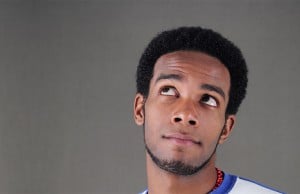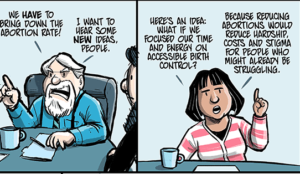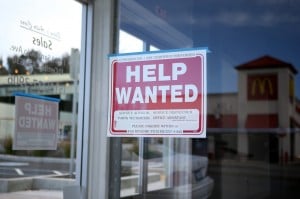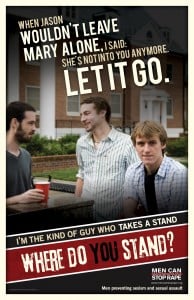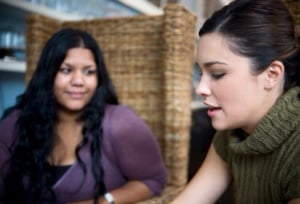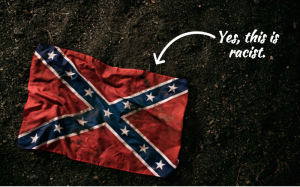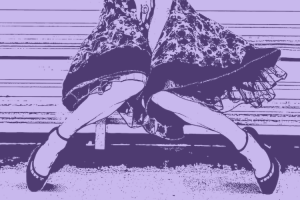Originally published on The Establishment and republished here with the author’s permission.
It’s a tough time to be a Black academic.
[On November 13, 2015,] Paris, a city that gave many African-American intellectuals shelter during dark times in American history, is in a state of mourning and disarray.
[On November 19, 2015,] portraits of Black professors were defaced – at, of all places, Harvard Law School. Among them was professor Annette Gordon-Reed, a fellow Dartmouth alum, and a Pulitzer Prize-winning author.
She has reached many of the milestones that I desire for in my own career: a National Book Award, a Guggenheim Fellowship, a MacArthur Fellowship, a National Humanities Medal. And yet, none of these prizes and acknowledgements kept someone from believing that her portrait should be defaced because of the color of her skin.
It was just one of many recent incidents refuting the societal myth that wealth and prestige can “save” a person from racism.
Next came the pictures of Jeremiah Ellison, son of US Representative Keith Ellison, holding his hands in the air as a police officer pointed a rifle toward him while at a protest in Minneapolis.
Before that, Fay Wells’s piece about 19 police showing up at her front door – her neighbor believing her to be breaking into her own house – landed in my inbox.
But my breaking point was a meme making its rounds on the Internet in the wake of the Mizzou protests. It’s a picture of Jonathan Butler, the Black student who led the hunger strike, with a photoshopped baseball cap on his head, and a statement asserting that he’s not an impoverished student fighting for change, but a graduate student whose family’s net worth is estimated to be millions.
Stop.
Stop right there.
I don’t need to know Butler’s background, or Jeremiah Ellison’s background. The details don’t matter to me; I know enough. These are Black people in hostile situations, set against the backdrop of a hostile world.
Tyler Perry gets pulled over in his Mercedes, just like my brother does, and just like every Black person I’ve talked to about the phenomenon of “driving while Black” does. There aren’t any tickets, or any warnings issued. It’s the world’s way of saying “we’re watching.”
It’s a phenomenon that even made it to The Fresh Prince of Bel-Air: Season 1, Episode 6. Carlton and Will are loaned a Mercedes Benz, and when they get lost, they’re taken to jail because the police officers think they’re thieves, and they couldn’t possibly have earned the right to drive the car.
The episode aired on October 15, 1990. As I write this, it’s November 24, 2015. Tell me, can television predict the future, or is history just repeating itself?
Privilege and bias are interesting bedfellows.
Being a privileged person – whether it is through education or income – is supposed to make you the exception to a bias. But sometimes a bias or prejudice is so strong that there are no exceptions – which, like the flashing lights of a police car in the rearview mirror, comes as a shock. But it shouldn’t.
Respectability will not save us.
Money isn’t always a way to escape. Education is not a guaranteed savior. Talking “white,” living right, and following the law will not shield us from hateful bigotry.
Ask James Blake, the retired tennis player who spent some time as a student at Harvard. His net worth didn’t stop police from tackling and handcuffing him in broad daylight in the middle of Manhattan.
The aftermath: “It’s not about race. We’re sorry. We thought you were someone else.” How many times will the oppressor use that line? I want to know who they think I am. Who they think my people are. It’s easier to spout platitudes than it is to explain them to someone who is hurting, who has to process trauma in real time.
As people of color, we are still appealing for our humanity, and at times it feels as if we’re trading money for the right to exist – to take up space and be included. Success (with a capital S) is seen as the cure for whatever social ills plague you.
Unhappy with your current school system? Make more money so you can move to a new locale. Want the best for your children? Well, that’s going to cost you if you want them to be competitive applicants.
Often, I ask high school and college students that I work with what their aspirations are, and they frequently tell me, “I just wanna be successful.” I think for them, Success is equal to the peace of mind that comes from doing things the right way, making it to the top of your respected field, and providing for your family. Success implies that you’ve moved away from the hustle.
I want to tell them that often, Success means little because it’s liquid: It could all go down the drain before we have the chance to use it to save any money. And God help you if you were born without – there was never anything to save.
I want to let them know that a sheet of paper cannot tell you who I am, whether it’s green and backed by the Federal Reserve or written in Latin, listing my accomplishments. I thought that earning my Bachelor’s from a competitive school guaranteed Success. It wasn’t until I got out into the real world that I learned that isn’t the way it works – they don’t tell you about the red tape in college.
Only the people who exchange dialogue with me, who execute projects with me, who take the time to learn about me and my history, will ever be able to quantify what I’m worth.
Just because I have a signifier than I can wave around proving I’m not “like everyone else” doesn’t mean I shouldn’t fight for social justice. If anything it’s another reason to – the things I’ve earned came about because of trailblazers and activists. I am just a link in that legacy.
The processors of our accomplishments, the people who we’re appealing to, continue to have the upper hand, whether it’s law enforcement or a little white woman with a gun. That white hot hostile racism takes many forms.
Do you want to know what oppression and fear taste like?
They taste like apples.
When I was nineteen years old, my father and I decided to go apple picking. I’d discovered the activity in New Hampshire while I was at Dartmouth College, and I wanted to share that experience with my dad, a farmer who conflated fruits of the earth with labor, not pleasure.
He’d never picked apples. He spent his childhood picking peaches, tomatoes, and cotton. After promising to make him a pie, we took his gold F-150 to a local orchard, paid for the bags we would put our apples in, and ventured out into the trees. We chose a spot far away from the pickers, on the edge of the farm, because we thought that the goods would be less picked over.
This would be our undoing.
About twenty minutes into our adventure, the owner’s wife drove up in her pickup truck, shotgun propped against her side, and asked us what we were doing so far away from the main group of customers. She accused us of taking more than our fair share. My father stepped in between me and this woman to indicate that she would have to shoot him first if it came down to it. That was all he could do to diffuse the situation.
Somehow it worked. The woman realized that my father was willing to put up a physical fight if it came down to it, and I believe that made her pause and reassess the situation. She decided that we weren’t worth the trouble, so she got in her truck and drove away. My father and I got in our truck and did the same – our bags only half full. Neither of us wanted to spend a moment longer in those trees.
We were very lucky that we had the opportunity to walk away.
I was wearing a long-sleeved Dartmouth shirt – I remember it because it was my favorite shirt and I had an affinity for pulling the threads at the cuff when I was nervous. It had a giant school crest in the middle and the cotton was thick enough to help me brace the Appalachian cold. I was literally wearing my pedigree – an indicator of my potential. But it didn’t matter. That shirt, and its demonstration that I was a woman with a career and a dream, couldn’t save me.
She had no idea who I was – I was just another n*gger with skin darker than hers that she thought might’ve been stealing from her, and she’d come to see what she could do about it. With a gun at her side.
After we left the apple farm, we sat in the driveway and cried. In between my sobs and attempts to control my rage, I looked at my father. His tears were different – they were slow drops of water that knew the misery was never-ending.
They were the tears that came with reopening old wounds – from years of hurt, just like the situation in the apple orchard.
I didn’t understand those tears yet – I wasn’t old enough. I was angry. He was just sad. When I calmed down, we talked about what we could have done differently. The incident illustrated what I’d been told my entire life – I was going to have to do everything right, and things still might not pan out for me. One mistake and someone could snatch my life away, and justify it.
“She was stealing,” the woman would’ve said.
“I feared for my life” would’ve been the catchphrase.
The story would’ve written itself. That’s the narrative we’re up against. We’re constantly lobbying for the rights of tortured Black bodies all over this country.
He was good.
She was getting an education.
He had so much potential.
That’s all money is – potential. It indicates very little if you don’t do anything with it. There are parents – just like my father – who wonder what they could’ve done to better protect their children, even though they’d made sacrifices to give their children opportunity.
Before he died, I made sure my father knew that he did the best he could in a world that was psychologically aggressive to both of us. I told him that one day I’d write about this thing. That I couldn’t stay silent, like he did. Nothing would change if I couldn’t talk about it.
Our generation is making a different set of sacrifices – now that we have access to these higher institutions of learning, we’re focused on making these landscapes hospitable for the activists that come behind us.
It means using technology to our advantage and being constantly plugged in, unable to sleep soundly because we’re aware of the fact that a hate crime could happen two or three timezones away. A movement or initiative might need our help, and with the power of the Internet, we can give it to them.
If we cannot lend our money, we can share our stories and create a dialogue that impacts public policy. We are no longer relegated to print and television, and there are so many ways to articulate struggle and celebrate success.
No matter how we decide to combat hatred, there is one thing I know for sure: Silence will be the death of us. We cannot let it happen. Privilege cannot save us, but there is power in community. There is power in solidarity.
There are no exceptions to the rules of racism – but we have each other, and our collective voice.
[do_widget id=’text-101′]
Latria Graham is an essayist, teaching artist and, if you ask anyone that’s ever sat down to dinner at her place, a damn fine cook. She hails from South Carolina, which she blames for her affinity for peach cobbler and bourbon. She credits her Appalachian upbringing for her need to write, whether it is a story is about social justice, an essay on mental illness, or a regional tall tale in which the men are larger than life, but the women are smarter than the men are large. You can find more of her musings on the American South at LatriaGraham.com and engage her on Twitter and Instagram @LGRaconteur.
Search our 3000+ articles!
Read our articles about:
Our online racial justice training
Used by hundreds of universities, non-profits, and businesses.
Click to learn more
Most Read Articles
- « Previous
- 1
- …
- 30
- 31
- 32






